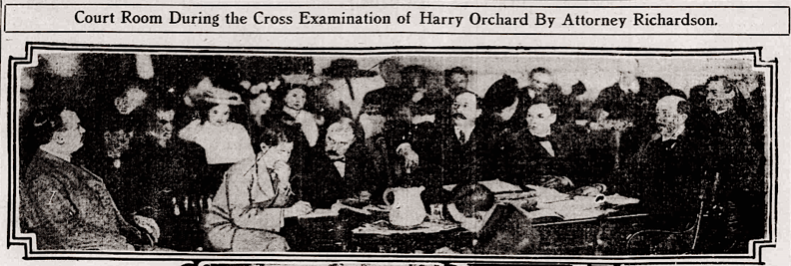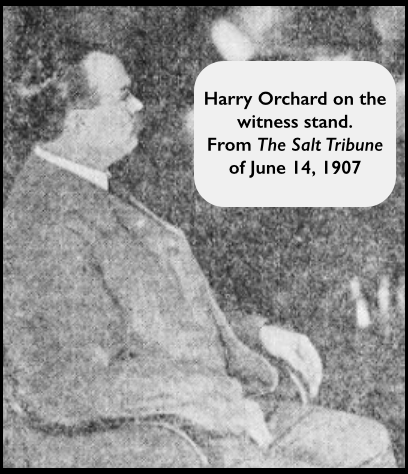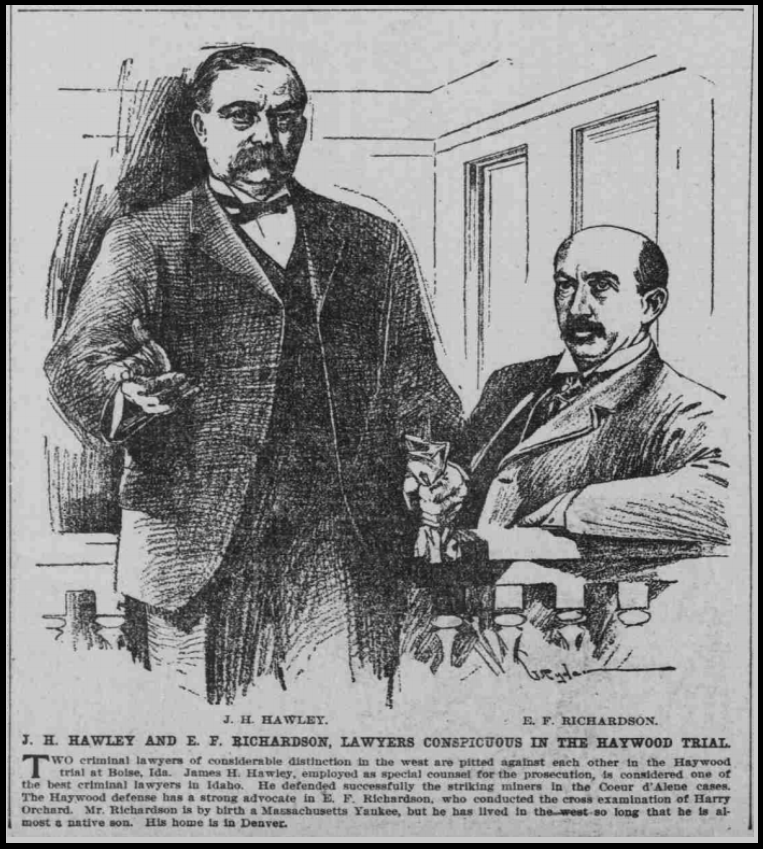powers of privilege will not go
to keep the workers in slavery.
-Mother Jones
Hellraisers Journal, Friday June 21, 1907
Boise, Idaho – Orchard Breaks Down Under Cross-Examination
Ida Crouch-Hazlett, editor of the Socialist Montana News, is on the scene in Boise covering the Haywood murder trial, and gives the following account of the cross-examination of the prosecution’s star witness, Harry Orchard, by Edmund Richardson, Attorney for the Defense:
Orchard Weeps
—–Breaks Down on Witness Stand-
McParland’s Methods Exposed
Under Richardson’s Fire
Boise, June 15.
The attitude of the Boise press towards this trial is a disgrace to the name of human freedom. The way the defense has riddled Orchard and shown his utter incompetency and reliability as a witness is potent to all observers. Even the judge looks disgusted at the revelations of this abandoned wretch, as he reluctantly makes admission after admission on the cross-examination to crimes be had not mentioned before. It is common comment that no jury could convict a man on such contaminated evidence. Yet the local papers, notably the “Statesman” [Idaho Daily Statesman of Boise] comes out with flaring articles about Richardson’s “blundering” ways, and his utter failure with the witness, how the friends of the defense are disgusted, and how the socialist reporters throw down their pencils in despair over his stupid efforts. It is needless to say that this is all fiction, pure and simple. Richardson’s work has been magnificent. He has held the strong, aggressive from the very beginning. Orchard has had to put forth a terrible defensive against him in order to bear up at all, and the tactics of the famous attorney have laid bare the very soul of the cringing and cowering murderer.
And yet to the scientific interpreter of the well springs of human action there is a burden upon the mind that is harrowing, painful, sorrowful. This man who sits here day after day enduring excruciating torture, is also a human being, and a most wretched product of the horrors to which capitalism forces the creatures that have become its victims. The economic explanation of phenomena illuminates the processes that have produced this unhappy wretch. Born of the working class, growing up with the untrained mind of the working class and the limited opportunities of the working class, his restless energies found no outlet save in the paths of crime. He was not a worse criminal than any of the capitalist examples all around him. He was only less competent. Capitalist society rewards every sort of crook better than the man that works, and Orchard found this out. But the antisocial attitude he had assumed wreaked its vengeance upon him. He was no part of any directing force; and to-day he is ground and crushed between the contending forces
As he sits in the witness chair these contending forces are fighting like beasts to achieve a victory over him. He must be tortured that certain interest may prevail. Every witness must be bullied and terrified if possible not that truth, but that interests shall prevail.
Thursday [June 13th] the location of this gruesome tale of death showed that the cross-examination was nearing its close. A new line of crime for Orchard was disclosed. It seems he has been making arrangements with Jack Maffat, a bartender at Wallace to go into smuggling at Seattle. And still the criminal record was unfolded. The man stole money from the store of his friend Murphy, who had made him many loans.
After he and Simpkins reached Caldwell and their murderous expedition, according to Orchard’s narrative, he called Easterly up by phone and asked him if he could help him out on a contract. But Easterly, it seems, was not prepared to assist Orchard on any thing. The latter testified, however, that he had a couple of letters from him which he tore up and threw away, but on telling the officers of them, they had recovered some pieces
The defense developed the point that on the occasion of Orchard’s trunk being lost on the railroad he had employed Fred Miller of Spokane as an attorney. This completely knocked out the attempt the prosecution has made all along to show that Miller in some mysterious way had shown up as Orchard’s attorney from general orders of the Western Federation to defend him.
It was shown that after being arrested for Steunenberg’s murder at Caldwell, James C. Sullivan of Denver came to see him. This man had been employed by Orchard as an attorney in Denver, in connection with some rooming house deal. The evidence went to show that Orchard asked Sullivan to telegraph to Fred Miller and that Attorney Stone of the prosecution had inspected the telegram
Richardson then laid special stress on the fact that Orchard was taken to the penitentiary in violation of the law in such cases, was refused information as to where he was going, and treated like a criminal, and was not even allowed to read the papers.
After some time of this harsh treatment McParland came to him. He stayed for an hour and a half, talked to him of God and the Bible, told him of his work with the Molly Maguires.
The prosecution seemed amazed as Orchard made his admissions. His disposition to follow instructions and tell the truth now was becoming embarrassing. Little by little Orchard was disclosing that old fox McParland’s crafty methods to control him. Borah tense and alarmed, was standing, Orchard was breaking down. He is in tears, as Mr. Richardson asked if McParland had emphasized the story of David stealing Urial’s wife.
Still the torture of the cowering wretch must be pursued. He who has been a manhunter cannot be spared now. Justice stands ready to be avenged, and human lives, and the integrity of the whole working class are at stake. McParland piece by piece told how he broke up the Mollie Maguires, or the Ancient Order of Hibernians, the organization of the coal miners’ in the anthracite regions. Richardson asked if he told how he became an officer in the union and himself paid $50 for one of the murders that he laid upon the men; that no crimes had been committed there till McParland came in 1873 as a paid detective.
Orchard had to admit that McParland told him the story of “Kelly the Bum,” the worst murderer in the coal fields, said he was a tool of the union, like Orchard, and how he had got him to turn state’s evidence; how he was not brought to trial, but allowed to leave the country and $800 raised for him; and how McParland kept repeating the tale that the state always took care of its witnesses.
Richardson named half a dozen men that were allowed to go free after turning state’s evidence. None of them were ever prosecuted for their crimes. He showed a minute knowledge of McParland’s actions; how, when the troops were brought against the strikers, they were ordered not to fire upon a certain gray coat. So the mine owners took care of those who led their workers to destruction.
This part of the examination was a merciless exposure of Pinkerton methods. Orchard hung his head. He could hardly talk. To the objections of the state Mr. Richardson replied that he had every right to test the credibility of the witness in every way. The judge ruled with the defense.
As Orchard told of his coming under McParland’s influence, Richardson wanted to know if a part of his conversation was to hang innocent men. Orchard said he had been told that he could do the state, himself and the country a great deal of good and that the state was always fair with its witnesses. He made a talk like a revival conversion talk.
What is the truth in this tangled mess of lies and subterfuges! The prevailing opinion seems to be that Orchard is an old Pinkerton detective, has been right along and is simply shaming.
The writer thinks differently. She is of the opinion that Orchard is a man placed in a position by which the danger and the horrors of his crimes, among which is undoubtedly that of trying to spy on and break up unions, has finally overcome him. He knows not whether to look for relief, and McParland has seen that the easiest way to handle him, was to play on the sentimental emotions of religion. For the time being he is in a way sincere, and he is braced up by the assurances of sympathy from the “big men” sufficiently to continue as a tool for breaking up the Federation.
The plausibility of his tale though received a terrible shock though in the hands of the relentless attorney for the defense. As Richardson charged him with wishing to add to his crimes by sending the labor men to the gallows, he hung his head and his answers were hardly audible.
That this whole scheme is the deepest sort of a Pinkerton conspiracy, is more evident at every step. The double dealer Orchard, is indeed a clumsy tool, whose only claim to efficiency was his willingness to commit crime.
As Charlie Mahoney, sitting president of the Federation, says, he has no doubts but what Orchard committed all the crimes he says, but it is impossible to connect the Western Federation of Miners with a single one.
Haywood is looking better and more cheerful since Richardson has torn the mask from Orchard’s tale. The friends of the defense are all feeling hopeful and encouraged.
Thursday afternoon the defense brought out how well Orchard had fared after the “confession” was out, and how adroitly he was put to work on Steve Adam. Orchard admitted it all as usual as Richardson forced it from him inch by inch. Adams was was put in his cell. He would work on him, and then report to McParland. He admitted he told Steve he was going across the pond, that Gooding called him “Harry,” and that no other prisoner is treated that way.
And so the defense closed its work Harry Orchard with the exception of some impeachment questions that it wished to ask when witnesses arrived.
The prosecution exhibited a bomb, said to have been found in front of Judge Gaddard’s [Goddard] gate which was identified by Orchard.
———-
[Photographs added.]
From The Topeka State Journal of June 15, 1907:
Hawley for the Prosecution & Richardson for the Defense
~~~~~~~~~~~~~~~~~~~~~~
SOURCES
Big Trouble: A Murder in a Small Western Town
Sets Off a Struggle for the Soul of America
-by J. Anthony Lukas
Simon and Schuster, Jul 17, 2012
(search: ida crouch hazlett)
https://books.google.com/books?id=d07IME-ezzQC
Montana News
“Owned and Published by the
Socialist Party of Montana”
(Helena Montana)
-June 20, 1907
http://chroniclingamerica.loc.gov/lccn/sn84024811/1907-06-20/ed-1/seq-1/
http://chroniclingamerica.loc.gov/lccn/sn84024811/1907-06-20/ed-1/seq-2/
IMAGES
HMP, Richardson Crosses Orchard, Richmond IN, June 18, 1907
http://chroniclingamerica.loc.gov/lccn/sn86058226/1907-06-18/ed-1/seq-1/
HMP, Harry Orchard on Witness Stand, SLTb, June 14, 1907
http://chroniclingamerica.loc.gov/lccn/sn83045396/1907-06-14/ed-1/seq-2/
HMP, Hawley, Richardson, Tpk St Jr, June 15, 1907
http://chroniclingamerica.loc.gov/lccn/sn82016014/1907-06-15/ed-1/seq-14/
See also:
For much more on the Haywood Trial,
the Haywood Family, the wives of Pettibone, Moyer,
and Adams, and the Socialists Press covering the trial:
Montana News of 1907
http://chroniclingamerica.loc.gov/lccn/sn84024811/issues/1907/
For the reporting of Wade Roscoe Parks:
Industrial Union of Bulletin (IWW) of June 15, 1907
https://www.marxists.org/history/usa/pubs/industrialworker/iub/v1n16-jun-15-1907-iub.pdf
Haywood Trial-Darrow Collection
http://moses.law.umn.edu/darrow/trials.php?tid=3
Trial Transcripts of Cross-Examination of Orchard
Note: pdf, slow to load.
Trial Transcripts, Haywood Trial, Volume 1, pp 1-504
June 4 -7, 1907.
http://moses.law.umn.edu/darrow/documents/VOL_1_HAYWOOD_TRANSCRIPT_PP_1_504.pdf
Trial Transcripts, Haywood Trial, Volume 2, pp 505-958
June, 8, 10, 11 1907.
http://moses.law.umn.edu/darrow/documents/Vol_2_Haywood_Transcript_p_505_958.pdf
Trial Transcripts, Haywood Trial, Volume 3, pp 959-1582
June 12, 13, 14, 15, 1907.
http://moses.law.umn.edu/darrow/documents/Vol_3_Haywood_Transcript_p_959_1582.pdf
The Sons of Molly Maguire, by The Irish Balladeers



